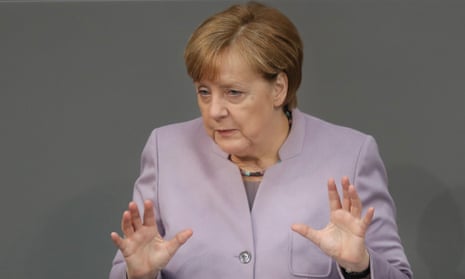Angela Merkel has said British politicians are still living under the “illusion” that the UK will retain most of its rights and privileges once it leaves the European Union.
Addressing her parliament ahead of this weekend’s EU summit at which European leaders will formally adopt Brexit negotiation guidelines, the German chancellor said: “Countries with a third country status – and that’s what Great Britain will be – cannot and will not have the same or even more rights as a member of the European Union. All 27 member states and the European institutions agree on this.”
“Ladies and gentlemen,” she continued, “you may think that all this is self-evident. But I have to put this so clearly because I get the impression that some in Great Britain still have illusions about this, and that is a waste of time.”
Merkel also said it made “no sense” to negotiate a future UK-EU relationship without agreement on the UK’s financial commitment to the EU, while also hinting that parallel discussions could be possible once questions about budget contributions had been satisfied.
“We can only make a deal about Britain’s future relationship to the EU once all questions about the terms of its exit can be clarified to a satisfying degree.
“That means the sooner the British government is prepared to find constructive solutions, the sooner we can engage with their desire to already talk during the exit negotiations about the future relationship between the United Kingdom and the European Union. But first we need to know how Great Britain sees its future relationship with us.”
Merkel said all 27 members agreed that this could be the only order in which the talks could proceed.
Merkel’s speech is a stern rebuke for Britain, which had been hoping there was some ambiguity in the EU position on whether trade talks could run in parallel with negotiations on separation terms before a financial settlement.
Minutes before the chancellor spoke, the UK foreign secretary, Boris Johnson, was pressed in a BBC interview about whether trade would have to wait until the divorce bill was settled and responded: “We’ll see.”
Merkel said talks about the UK’s financial contributions to the EU budget could not wait until the end of the negotiations but had to be part of the talks from the start. Crucially, the German chancellor said that the financial commitments Britain had entered into would “extend into the period after Britain’s exit” from the bloc.
Her demand for a more constructive approach from Britain reflects growing irritation at the blithe assurances of UK ministers that they can bend the EU27 to their will when talks start. But it is her attack on the “illusions” of the British position on access to the single market that may cause the biggest ripples in Westminster – both for Conservatives and Labour.
The Labour Brexit spokesman, Keir Starmer, and the government are united in believing they can persuade the EU to provide the benefits of the single market and customs union without agreeing to freedom of movement. With Merkel facing an election of her own later this year against an opponent who says it is inconceivable that lorries and money should be able to cross borders freely, but not people, the German chancellor appears to be making clear she has her own political red lines.
In a speech met with supportive applause by the assembled Bundestag, Merkel also identified the need to protect rights of an estimated 100,000 German citizens living in the UK as her government’s first priority. In return, she added, Germany would be prepared to make a “fair offer” to British citizens living in Germany.
The importance of Merkel’s statement that parallel negotiations made “no sense” lies in British hopes that there was a chink of light on the matter in draft EU negotiating proposals. These suggested that there needed to be only broad agreement that Britain would pay a settlement before talks on trade could begin. But it is increasingly clear that this will leave little room for future haggling in the eyes of Europe’s most powerful leader.
Theresa May, who is already facing calls from British business leaders not to let the divorce bill stand in the way of more valuable trade ties, could find herself having to explain how she had committed the UK to pay tens of billions of euros before she had anything to show for it.
